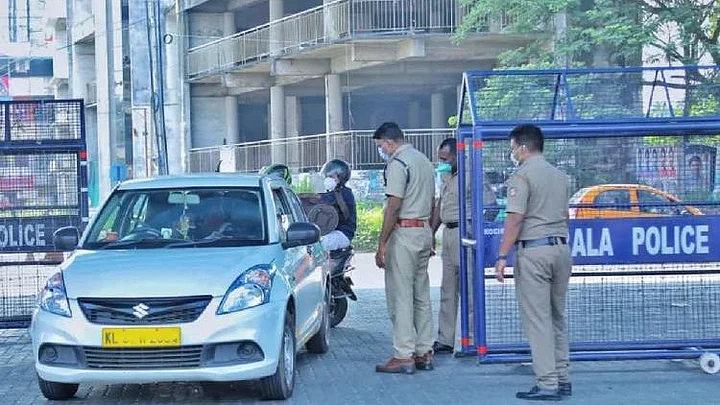Amid an alarming surge in daily COVID cases in Kerala, the state has announced a complete lockdown on the weekend (31 July-1 August) with the same guidelines issued last month for 12-13 June.
On Wednesday, 28 July, Kerala recorded 22,056 new COVID-19 cases, taking the number of total cases to 33,27,301, with 131 more deaths.
Meanwhile, the central government is sending a six-member team from the National Centre for Disease Control to the state.
As a large number of COVID cases are still being reported in Kerala, the team will aid the state's ongoing efforts in COVID management.Union Health Minister Mansukh Mandaviya, as quoted by NDTV.
Are there any exemptions for the weekend? What are the additional guidelines? Here's all you need to know.
What are the additional guidelines?
Earlier, Local Self Government Institutions (LSGIs) in Kerala were categorised based on the seven-day average Test Positivity rate. This was followed by relaxations in areas where TPR is less, and intensified restrictions were imposed in areas with higher TPR.
As per the news guidelines, existing categorisation of LSGIs and restrictions/relaxations in respective categories will continue.
What exemptions have been made?
Photo studios will be permitted to function in LSGIs on allowable days in the respective LSGIs in view of the NEET examinations requirements.
Price section of Economics and Statistics Department is included as an essential service for working on all days with required staff.
The Kerala Books and Publication Society will be allowed to function during Saturday and Sunday as well, for the purposes of printing text books.
Shops selling seeds and fertilisers will be permitted to function
Which shops are allowed to function?
Stores selling food, groceries, fruits, vegetables, milk, dairy products, meat, fish, and bakeries can function
Ration shops under PDS are allowed to remain open
Stores selling animal fodder, poultry, and cattle feed can remain open
Shops selling building material, electrical and plumbing equipment, raw material for industries, and packing material are allowed to remain open
Can I travel to Kerala? Do I need an RT-PCR test?
Yes, you can still continue to travel to Kerala. Fully-vaccinated persons do not require an RT-PCR to enter the state.
Is intra-state travel allowed?
Yes, intra-state travel is allowed, without any restriction.
Is it mandatory for government employees to go to office?
All government offices, including the PSUs, companies and autonomous organisations will function with 50 percent attendance in A and B categories.
A refers to those areas with TPR 5 or below, and B to areas with TPR between 5 and 10.
However, attendance should be only 25 percent in places belonging to the C category (where TPR is between 10 and 15).
However, essential services are allowed to function in all categories.
Can I opt for Work From Home (WFH) in Kerala?
According to the guidelines, only employees connected with the ongoing Kerala Legislative Assembly questions and related activities will have to attend office while others can opt for WFH.
Why are COVID-19 cases still surging in Kerala?
Virologists across the country have appreciated Kerala for being one of the most ‘honest’ in terms of reporting. This has been corroborated by sero surveys as the latest national sero survey showed that for every infection that gets detected, about 25 go unreported.
However, in Kerala, it was found that only about five infections go unreported for every reported case. But this still doesn’t explain the increase in infection rate.
The test positivity rate rose from 10.59 percent to 12.35 percent on Tuesday, with the state topping the number of active cases in the country.
Senior virologist Dr Jacob T John explained, “The fast pace of infection is due to the Delta variant. The earlier Wuhan B614G variant showed how one infected person could infect two others. The Delta variant has showed, one person that infect six people.”
Kerala, however, has been reporting a low mortality rate, which is being cited as evidence of the state’s efficient handling of the pandemic. The state has a fatality ratio of 0.47, against the country average of 1.32, which can be partly attributed to the large number of cases.
What needs to be done if there is a COVID case in my residential complex?
The guidelines encourage office-bearers of resident’s associations to be alert and ensure inhouse containment activities.
The flat number where the case has been reported should be displayed and health authorities should be informed promptly.
The guidelines also urge people to take utmost care not to ostracise the infected individuals.
Additionally, Union Health Secretary Rajesh Bhushan wrote to the Kerala government on "super spreader events" observed in the state recently. Bhushan emphasised that COVID guidelines need to be followed properly, adding that "compliance with mass/social gatherings guidelines need to be enforced strictly", ANI reported.
Which states require an RT-PCR from Kerala travellers?
Recently, the Tamil Nadu Government has made the RT-PCR test with negative results mandatory for travellers from Kerala. The requirement will come into effect from 5 August.
Speaking to the media, on Sunday, 1 August, in front of the Indira Gandhi International Airport, Chennai, Minister of Ma Subramaniam said that all people entering Tamil Nadu from Kerala either by plane, road or train will be required to furnish a recent RT PCR test, The News Minute reported.
Those who are fully vaccinated will have to show the vaccination certificate and the second shot have been taken at least 14 days prior to the date of entry into Tamil Nadu.
Apart from Tamil Nadu, Karnataka has also made the RT-PCR test compulsory that should not be older than 72 hours for people travelling from Kerala. The rule applies for everyone including people who are fully-vaccinated.
(With inputs from ANI, NDTV and The News Minute)
(At The Quint, we question everything. Play an active role in shaping our journalism by becoming a member today.)
